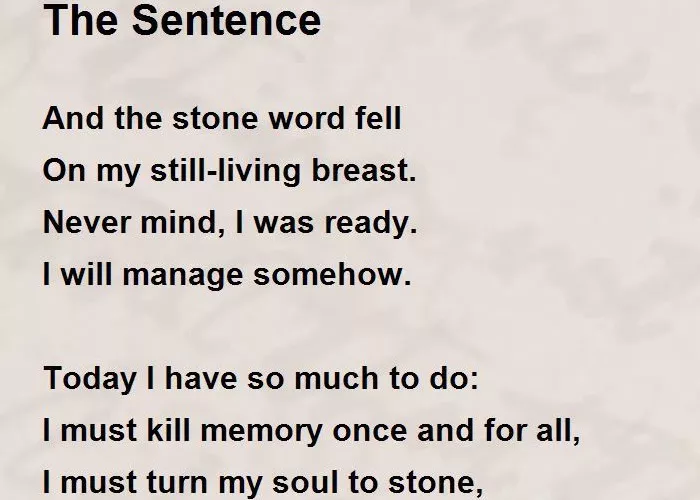Welcome to Poem of the Day – The Sentence by Anna Akhmatova.
Anna Akhmatova, one of Russia’s most profound and enduring poets, often wrote in a way that merged personal suffering with universal themes. In her poem The Sentence, Akhmatova encapsulates a moment of devastating personal loss while addressing the broader human condition. Through its stark language and restrained emotion, the poem portrays a haunting exploration of grief, resilience, and the search for meaning in the aftermath of calamity.
Context and Historical Background
Akhmatova wrote The Sentence during one of the most turbulent periods of her life. Her personal losses were compounded by the political upheaval of Stalinist Russia, where terror and repression reached into the lives of ordinary citizens. Akhmatova’s works from this era, especially those in her Requiem cycle, reflect the harrowing experiences of waiting in prison queues and enduring state oppression. These poems are deeply personal yet serve as collective monuments to the suffering of a generation.
The Sentence Poem Explanation
“And the stone word fell / On my still-living breast.”
The opening lines of The Sentence immediately establish the emotional core of the poem: the unbearable weight of receiving devastating news. The metaphor of the “stone word” signifies an irreversible verdict, likely a reference to the death or imprisonment of a loved one. This opening conveys a dual sense of violence and permanence, as if the act of speaking alone could break the fragile human spirit.
“Never mind, I was ready. / I will manage somehow.”
These lines illustrate Akhmatova’s characteristic stoicism. Despite the overwhelming grief, the speaker declares their readiness to face it. This assertion is not born of indifference but of a deep inner strength forged in the crucible of repeated trauma. It suggests a resolve to endure, a hallmark of Akhmatova’s poetic voice.
“Today I have so much to do: / I must kill memory once and for all.”
The poem then takes a chilling turn as the speaker confronts the psychological toll of loss. The imperative to “kill memory” signifies an attempt to erase the pain associated with remembrance. Yet, this directive is laced with irony, for memory is inescapable and defines much of human existence. The phrase underscores the futility of denying grief while acknowledging the necessity of moving forward.
“I must turn my soul to stone, / I must learn to live again.”
Here, the speaker adopts a metaphor of self-transformation. Turning the soul to stone reflects the hardening required to survive immense sorrow. It is a form of self-preservation, where emotional vulnerability must be suppressed to ensure survival. The line “I must learn to live again” acknowledges the profound disruption loss causes in one’s life, requiring not merely endurance but the reinvention of existence.
“If not… the hot rustle of summer.”
The closing lines introduce a subtle, almost paradoxical glimmer of hope. The “hot rustle of summer” contrasts with the cold permanence of stone and the weight of grief. It suggests that despite the speaker’s resolve to become numb, life persists in its cyclical and unrelenting beauty. The natural imagery hints at the possibility of renewal, even in the depths of despair.
Themes
Grief and Loss:At its heart, The Sentence is a meditation on loss—personal, societal, and existential. The poem articulates the human experience of receiving life-altering news and grappling with its aftermath.
Resilience and Survival:Akhmatova’s poetry often embodies resilience, and The Sentence is no exception. The speaker’s resolve to endure, even when faced with insurmountable sorrow, speaks to the strength of the human spirit.
The Interplay of Memory and Forgetting:The poem highlights the dual-edged nature of memory. While it preserves the essence of what is lost, it also prolongs pain, forcing the speaker to confront whether forgetting is a necessary step toward healing.
Nature as a Metaphor for Continuity:The fleeting reference to summer serves as a counterpoint to the poem’s heavy tone, symbolizing the persistence of life and the cyclical nature of existence.
Stylistic Features
Akhmatova’s style in The Sentence is marked by simplicity and precision. Her economy of language allows the weight of each word to resonate deeply. The poem’s structure mirrors the progression of grief, moving from the initial shock to a hardened determination to endure. The use of metaphor—stone, memory, summer—enriches the emotional texture, allowing readers to connect with the abstract experience of loss on a visceral level.
Conclusion
In The Sentence, Anna Akhmatova crafts a poignant reflection on the human capacity for endurance in the face of unimaginable sorrow. Through its restrained yet evocative language, the poem speaks to the resilience of the human spirit and the ways we navigate the interplay of memory, loss, and survival. It is both a deeply personal expression of grief and a universal testament to the enduring strength of the soul. In Akhmatova’s hands, even the heaviest stone can bear witness to the unyielding persistence of life.

